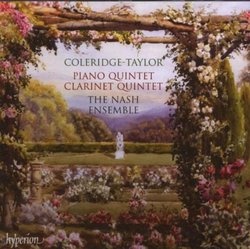| All Artists: Samuel [Composer] Coleridge-Taylor, Nash Ensemble Title: Coleridge-Taylor: Piano Quintet; Clarinet Quintet Members Wishing: 2 Total Copies: 0 Label: Hyperion UK Original Release Date: 1/1/2007 Re-Release Date: 10/9/2007 Album Type: Import Genre: Classical Styles: Chamber Music, Historical Periods, Classical (c.1770-1830) Number of Discs: 1 SwapaCD Credits: 1 UPC: 034571175904 |
Search - Samuel [Composer] Coleridge-Taylor, Nash Ensemble :: Coleridge-Taylor: Piano Quintet; Clarinet Quintet
 | Samuel [Composer] Coleridge-Taylor, Nash Ensemble Coleridge-Taylor: Piano Quintet; Clarinet Quintet Genre: Classical
|
Larger Image |
CD Details |
CD ReviewsA Rising Star among Black Composers! David A. Hollingsworth | Washington, DC USA | 03/09/2008 (5 out of 5 stars) "In recent years, attention to prominent if not notable yet underperformed black classical composers have only began to blossom, with record labels such as Hyperion, Naxos, Cedille, & Lyrita giving us the exposures of their works that were way overdue yes, but all the welcome at that. Cedille Records in particular ought to be commended for featuring works of Hailstork (whose work Epitaph for a Man who Dreamed is very moving and ought to be programmed more often), William Grant Still, Chevalier J.J.O. de Meude-Monpas, Banfield, and others. Lyrita has done its part in recording and reissuing a good volume of music of especially of Samuel Coleridge-Taylor. And now we have this award-winning Hyperion album that should raise Coleridge-Taylor's status as a serious, major composer immeasurably.
Let me say upfront that The Nash Ensemble is just absolutely superb throughout, playing every note, every bar with verve and with that subconscious artistic sensibility that suits the music remarkably well. This Ensemble clearly have never lost its imaginative touch before and since its magnificent Bax Hyperion album (of his chamber works). And the Piano Quintet op. 1 (1893) is nicely fresh and assured. Its staunch beginning evokes Stanford somewhat, but The Nash Ensemble shows how well this piece could stand on its own two feet. The Larghetto second movement is especially graceful under their hands and the impetus of the third movement along with its allure are nicely conveyed by this team. Ian Brown is especially dashing in the finale, but like violinist Marianne Thorsen, very moving as well, as in the Ballad (1907), which is quite a somber, impassionate piece that would have done Rachmaninoff, Tchaikovsky & even Glazunov proud. He wrote this piece for the Russian-born violinist Michael Zacherewitsch, who premiered it in Leeds in October 1907, with the composer at the piano. And The Nash Ensemble likewise comes up huge in the Clarinet Quintet. Written two years after the Piano Quintet, this work shows Coleridge-Taylor as a more accomplished composer (though admittedly not as fresh and bold as in his earlier enterprise). Answering to the challenge of Stanford that no one could shake off Brahms' influence (after he produced his own Clarinet Quintet), Coleridge-Taylor, to Stanford's delight, proved him wrong and Stanford went so far as to promote the piece to Joachim, who played it with his colleagues in 1897. But nothing much came of it in terms of recognition thereafter. And it was only in the year 2000 that the copyright of the work was assigned to Breitkopf & Härtel, the very firm that was offered publication roughly a century ago. Nevertheless, despite some obvious influences of Dvorak, this work is not so derivative. Published as his opus 10 and written when he was nineteen, this piece is as surefooted as it can be, with the ideas nicely wrought and meticulous. But it is his earlier Piano Quintet that have a greater emotional impact. In any event, this is a very indispensible, extremely well-presented album: the one that would (if not should) win the hearts of many of us who appreciates music and who knows deep down what good music is (outside the politics of it all). Coleridge-Taylor's music on this very album goes far beyond what is deemed good music. " |

 Track Listings (9) - Disc #1
Track Listings (9) - Disc #1